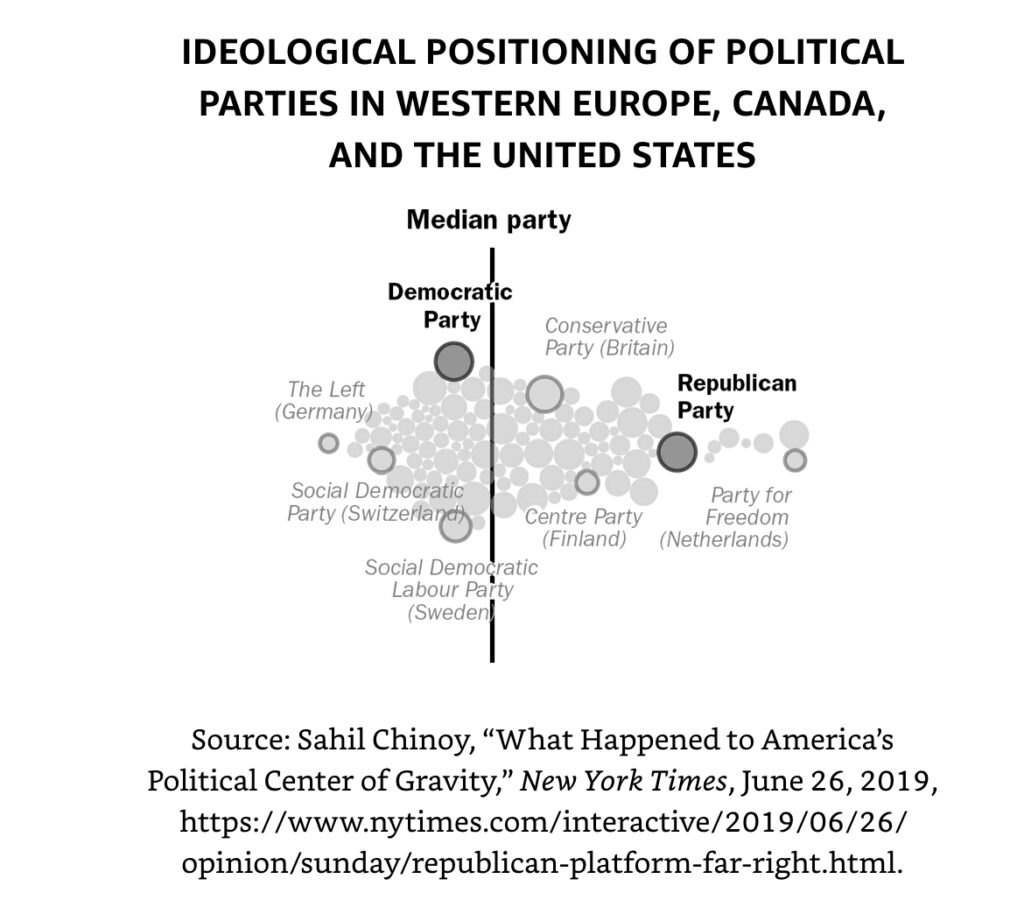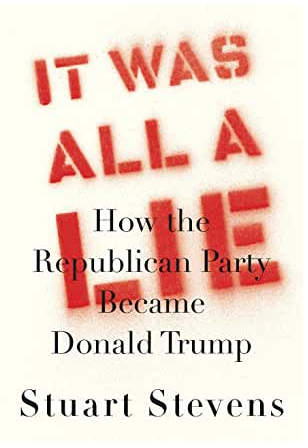As with my post last Sunday, this blog post started out as a video. You can see it here. What follows is an [edited] transcript.
This week I want to talk about totalitarianism—which is something we don’t talk about enough. There is an aspect to totalitarianism that helps explain a lot of what we are seeing. The aspect is this: The people believe and take as fact whatever they are told to believe.
There is overlap between authoritarianism and totalitarianism, of course, but this aspect of totalitarianism gives us a useful framework for understanding what’s happening in the Republican Party.
The latest chapter in the saga of the radicalization of the Republican Party centers on Liz Cheney, the Republican representative from Wyoming, and yes, the daughter of former vice president Dick Cheney. Cheney is refusing to go along with Trump’s lie that he won the election. Now Trump evidently wants her removed from her leadership position, and he apparently still controls enough Republican congressman and women so they’re going to bring the matter to a vote again.
Cheney wrote an Op-Ed last week for The Washington Post presenting the situation as a turning point for the Republican Party. She said, if the party continues to embrace this lie, the party will unmoor itself from the truth and the Constitution. (Actually, this has already happened. Cheney is a little late to the party.)
The vote will probably be next week, and again it looks like the ballot will be secret. This of course has everyone wondering, “Will she or won’t she be removed?” And “will this really be a turning point for the Republican Party?”
I suggest that if the ballot is secret, there won’t be any turning point. The Republican Party will continue drifting to the right and will continue becoming even more extremist.
After the insurrection and all those lies, you might wonder: How much more extreme can the Republican Party become? One person on Twitter asked, “Where else can this go?”
What’s next—and where the party is drifting—is more deeply into totalitarianism.
I found this chart in Let Them Eat Tweets, by Yale political scientist Jacob Hacker, and Berkeley political scientist Paul Pierson:
The chart is based on a systematic analysis of the campaign platforms of leading parties. It shows that the Republican Party is now positioned to the right of mainstream conservatives. You can see there is still room for the Republican Party to move even further right.
The extreme right (and the extreme left) on the political spectrum both lead to totalitarianism. Totalitarianism is when the individual is completely subsumed and thinks and believes only what he or she is told to believe. Totalitarianism, like fascism, is based on lies. In fascism, everyone gets in line. Fascists like an identifying piece of clothing, like a uniform. Italian fascist under Mussolini wore brownshirts. The KKK had white sheets. MAGA hats, anyone?
Totalitarianism takes this extreme ordering and compliance once step farther: In a totalitarian society, all people have the same beliefs and the same thoughts. They all accept the reality presented to them by the controlling authorities.
Orwell explained that totalitarianism is achieved through psychological manipulation. The individual is so overwhelmed that he or she no longer has the capacity for independent thought. The modern way to achieve this is through what’s been called a Firehose of Falsehoods, a propaganda technique that overwhelms the individual with lies and leaves them feeling that the truth is unknowable. The idea is that if Trump says he won the election, that becomes a fact.
Kevin McCarthy, the Republican minority leader, who is moving to push Cheney out, said:
Notice the phrase, “The message.” This is the key. All must accept the same truth and repeat the same message.
When the pandemic hit, remember, Trump had no interest in trying to control the virus. What he wanted to do was control the narrative. If everyone believed what Trump and his spokespeople said—Covid was no worse than the flu, people were dying of other causes, and the numbers were being exaggerated—the pandemic would cease to be a problem. It would be wished out of existence. He then could not be faulted for an inadequate response to a pandemic if that pandemic didn’t exist.
This is a variation of the standard question from college philosophy classes: “If a tree falls in the woods, but nobody heard, did it make a noise?” In a totalitarian regime, the question, “If a tree falls in the woods, but nobody actually believes it fell, did it really fall?” If there is a pandemic, but nobody believes there’s a pandemic, is there really a pandemic. If it’s never in the history books, did it happen?”
If Trump lost the election, but enough people believe he won, did he really lose? You can either win an election, or you can figure out how to get enough people to believe you won. Trump’s approach is the latter. In the totalitarianism that he envisions, whatever he says becomes reality.
The shocking part is how many members of the Republican leadership are willing to go along with this.
In the 20th century totalitarian regimes, the order that individuals must disbelieve the evidence of their eyes and ears was the “final, most essential command” of the totalitarian regime. In the 21st century, totalitarian regimes begin by undermining factuality. After factuality is undermined and individuals no longer have the capacity to figure out what is true and what isn’t, physical coercion begins.
This feels like a turning point for Liz Cheney because she personally reached a line she can’t cross, or won’t cross. She reached her limit. In the past, she embraced lies. She flirted with totalitarianism. But she sees now where this is leading. She sees that Trump’s lies can actually make free and fair elections in the United States a thing of the past.
We’ve all watched over the past few years as various Republicans reach their limit. Some Republicans jumped ship when Trump became the nominee. Others, not until after he became president. Each Republican who reaches his or her limits goes through something as each comes to terms with where the party is going.
Liz Cheney campaigned for Trump in 2020, so she was fine with all Trump’s lies during the four years he was in office. (Surely she knew he was lying. The Washington Post documented more than 30,000 lies Trump told during his four years in the White House.) But she reached her limit with the insurrection, which she understood was sparked by the lie that Trump won the election.
Cheney is also right that to stop the Republican slide toward totalitarianism, enough Republicans have to denounce the lie. But this would require an open vote, not a secret vote.
If the vote is secret and a majority vote in her favor, and if they still don’t have the nerve to say it out loud that it was a lie and take the heat for it, nothing will really change. The only thing that tell you is that a lot of Republican leaders are going along with Trump’s lie even though they know it’s a lie and they know they should be following Cheney’s example, but they aren’t because the lack moral courage, or they care more about power than truth.
There have been rumors for a while that a lot of the Republican leadership just wishes Trump would disappear. Maggie Haberman of the New York Times reported last month that, just like when Donald J. Trump was a candidate in 2016, Republicans are trying to avoid becoming the target of his attacks or directly confronting him, while hoping someone else will.
Former Republican strategist Stuart Stevens, in his book It Was All a Lie, wrote last year that most Republican elected officials wish that one of the other fifteen candidates who ran for president in 2016 were now in the White House. They love to whisper this to each other and to journalists off the record.
In other words, many of them want Trump gone, but they’re too cowardly to confront him. (I’m not persuaded that they want him gone because they disagree with his policies or the direction he wants to take the country. I think they find his methods and personality offensive.)
So, for whatever reason, they’re silent. Well. If you do the wrong thing because you’re a coward instead of evil, you’re still doing the wrong thing. Trump doesn’t care why you go along with his lie. He doesn’t care if you go along with his lie because you are deceived, or if you go along with his lie because you’re too cowardly to confront him, or because you believe the lie serves a higher purpose. Whatever the reason if enough people go along with the lie, it can become truth in this totalitarian way.
Last week, I talked about fascist lies and why someone like Cheney might go along with the lies for so long, and why now so many members of the Republican leadership are going along even though they know they’re lies. (Some of them, of course, truly believe that everything Donald Trump says is the truth, as do many of the QAnon base). The ones who happily and willingly go along with the lies, even though they know they are lies, see the lies in service to a higher truth. They believe the lies serve a higher purpose.
Yesterday the Washington Post reported an incident that had Liz Cheney quite alarmed at the degree to which the Republican Party is disregarding facts. At a party retreat in April, she and others listened to a polling briefing. The staff from the National Republican Committee left out a key fact. They left out a finding of where Trump was weak. Cheney was alarmed that they were just leaving out this bad fact.
But leaving out bad facts makes perfect sense in a party moving toward totalitarianism. In a totalitarian society, facts don’t matter. They are irrelevant. Whether or not the tree falls in the woods doesn’t matter. What matters is whether everyone believes the tree fell (or didn’t fall, depending on what the authorities want you to believe.)
If the vote to oust Cheney is secret and they do vote to oust her, it doesn’t tell us anything other than a majority of Republicans fully embrace the lie and are willing to set aside the evidence of their eyes and ears and accept whatever Trump tells them is true.
Now, on the other hand, if the vote is not secret it might be a watershed moment — if enough Republican members of Congress have the courage to say aloud that the election was not stolen and that Trump didn’t win. If they do that, it gets harder for Trump to maintain the illusion. Trump’s power lessens, and it becomes harder for his successor to just pick up where he left off. It stops or slows the Republican slide toward totalitarianism.
The one possibility that might be a watershed moment: The vote is open and they vote to keep her in her position of power, is something I don’t expect. It would be great, but the Republican leadership had their chance to save the party from sliding further into extremism with two impeachments.
What do the rest of us do as the Republican Party embraces totalitarianism? We hold on to the truth, even when people around us are resistant to the truth. We vote in every election, at every level.



